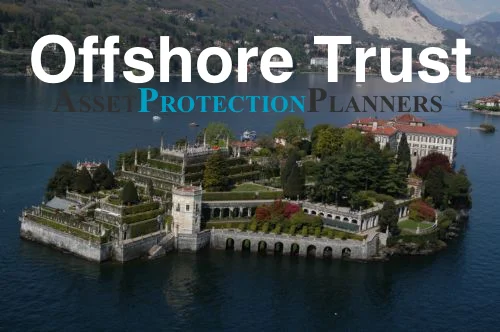Offshore asset protection includes the use of legal tools such as LLCs and trusts in jurisdictions that have debtor friendly laws. There are several of these financial haven jurisdictions that cater to foreign investment. They do this by creating legal statutes dedicated to protecting the assets of investors. In order to attract capital they are aware that they must offer a safer legal climate than is available in one’s home jurisdiction. Countries such as Cook Islands, Nevis and Belize, to name a few, offer some of the world’s strongest asset protection statutes.
The use of LLCs and trusts in these jurisdictions can provide a high level of offshore asset protection. Here is why. With an offshore trust service, the trustee is beyond the reach of your local court. Thus, they need not follow the instructions of the judge down the street from you who is trying to take your money and give it to your opponent.

Offshore Asset Protection Trust + LLC
When you combine the instruments in these jurisdictions you have have a powerful balance of protection and convenience. That is, you place an offshore LLC in Nevis (in the Caribbean) into a trust in the Cook Islands (in the South Pacific). The Nevis LLC holds your offshore banking and stock brokerage accounts (in a country such as Switzerland). Since the judge in your country has jurisdiction over local banks, you utilize strong, safe convenient international financial institutions. It has never been more convenient than today. With online access your funds are a mere mouse click away.
To review so far, you have an offshore trust in the Cook Islands. The offshore asset protection trust owns 100% of a Nevis LLC. The Nevis offshore LLC holds the bank account. So, why do we do this? The Nevis LLC gives you the remote control. The Nevis LLC is encased inside of your bulletproof reinforced concrete fortress called the trust. You are the manager of the Nevis LLC until the “bad thing” happens. Likewise, you are the signatory on the bank accounts. As such, you can wire yourself money. If you are an investor you pick the stocks yourself or direct your money manager, etc.
Moreover, the LLC is typically superior to the offshore corporation for tax purposes. Unlike an offshore corporation, the owner can set up the LLC as a tax flow through entity. So, there is no tax a the company level.

Protective Mode
So, what do you do when stricken with a lawsuit or judgment? When someone hits you with a lawsuit or if you are in a lawsuit already and things don’t go your way, you move into protective mode. You have have the trustee step in as manager of the LLC. That way, nobody can successfully order you to bring back the funds. If you remained as signatory, the judge could order you to return the funds. When your international trustee steps in to protect you, you now have an advocate on your side; one who is beyond the reach of the judge down the street.
Why a Cook Islands trust? Let’s compare the offshore asset protection trust jurisdictions: Cook Islands, Nevis and Belize. In 1989, the Cook Islands enacted the International Trusts Amendment Act. This amended the old International Trusts Act (“ITA”), enacted in 1982. This amendment put Cook Islands on the map as a international financial haven. The Cook Islands parliament tailored laws to give asset protection to U.S. clients unlike any U.S.-based entity offers. First, the Cook Islands has a short statute of limitations on fraudulent transfer of only one to to years. Specifically, let’s say an individual formed a trust. After two years from the date of the cause of action, or, if within the two years the creditor does not file proceedings the Cook Islands, it is too late. The creditor’s claim could not proceed.

Statute of Limitations
Even if an action was brought within the one to two year timeframe, the law also erects nearly insurmountable barriers. The plaintiff or creditor would have to show “beyond reasonable doubt” that the defendant or debtor established the trust with the intent to defraud that particular creditor. Not any creditor, mind you; but that particular one. We have not seen any of our clients lose funds placed inside of a Cook Islands Trust that we have established.
Offshore asset protection services offer an individual the world’s strongest asset protection statutes. The Cook Islands trust’s protective features are backed by case law. Combining the LLC and the trust gives control doing the “good times” and protection during the “bad times.”

Barrier after Barrier
These protective jurisdictions frown on frivolous lawsuits, unlike the litigious U.S. legal system. When assets are protected offshore it creates a substantial legal hurdle. In most cases, pursuing assets offshore is cost prohibitive for a legal opponent. Even if a deep-pocketed creditor would be hard-pressed to see a return on investment. We have also found that merely holding assets in a properly established offshore service plan can reduce or nearly eliminate the chances of litigation in the first place.

Mechanics of Offshore Services
When you encumber assets in offshore planning tools, the last layer of defense is separation from one’s home legal jurisdiction. Foreign courts to not recognize domestic court orders. Even if someone is able to slap you with a judgment, the you can retain your assets. That is, a creditor can try to make claim to your assets with court orders. However those orders will fall on deaf ears offshore. Let’s suppose a judgment creditor wishes to pursue the assets offshore. Their attorney team would have to satisfy the foreign jurisdiction’s legal requirements. Their legislatures created these legal requirements with the intent to keep creditors from getting to a debtor’s assets.
Now, the next part is a real stretch. It is a stretch because, in practice, it only happens in about one out of a thousand cases. That is, pursing assets offshore. In almost all cases pursuing assets offshore would require local legal counsel. Your opponent would need to build a new case with a new attorney team in the foreign country. The top offshore jurisdictions do not allow their local counsel to take cases on contingency. This is generally enough to deter a creditor from pursuing an individual’s assets.
In some cases the foreign jurisdiction requires a board review of the case before they allow it to proceed. The most protective jurisdictions have huge bonds that must be posted in order to have a case reviewed, sometimes cases $25,000 to $100,000. That is non-refundable or forfeited should the panel not accept the case. Only a legal opponent with near absolute odds of success would play the game this deep into the process.

Domestic and Offshore Services
One can also utilize offshore legal structures to augment domestic asset protection planning. Individuals who are less comfortable with an entirely offshore service plan may choose to go this route. There is a myriad of ways to take advantage of these protective vehicles. One of them is to utilize an offshore instrument as a last layer of defense against a judgment.
You can use business entities as control instruments. Then, an asset protection trust holds the entities. You conduct day-to-day management of assets. You can hold funds onshore for simplicity, if desired. In the event of legal duress, the management provisions drafted in the trust transfer protection to an offshore trustee. Combining on and offshore planning services is more complex and requires careful implementation. However, it can bridge the gap for those who wish to utilize a mostly domestic service plans with the benefits that offshore vehicles offer.

How it Works
By establishing several asset protection vehicles you can create a judgement proof plan and still maintain hands-on asset management while the coast is clear. The key element here is an offshore trust that will own a private business entity. The company is used as the management tool. The manager is, by default [you], the trust settlor. Custom provisions within the trust deed specify management roles. When the trust is set up properly with asset protection provisions, the trustee can remove the manager from duty when necessary, according to the terms of the trust. Legal duress can trigger the management transfer whereby the offshore trustee automatically removes the default manager. With the assets rest in the hands of a reputable offshore trustee, your local courts cannot compel an offshore trustee to relinquish trust assets.
This allows an individual to maintain control over all of the day to day activities and the assets held within the trust, when times are good. In the event of legal duress, only management duty is transferred. Therefore it ties the hands of a creditor from winning a fraudulent conveyance argument.

Increased Privacy
Privacy is another layer of protection with offshore services. The entire list of top recommended jurisdictions cannot disclose the names of the owners to others, by law. Naturally, there are exceptions if acts of terrorism, money laundering or criminal atrocity has taken place. Plus the banks need to comply with due diligence and know-your-client regulations.

Offshore Benefits
Lawsuit deterrence, judgment proof protection, privacy, and settlement negotiation power. Eventually, a legal opponent will see the uphill battle in pursuing assets protected offshore. They face additional legal costs. Therefore, he/she may reevaluate the merits of filing a lawsuit or might settle for a fraction of the judgment amount. Offshore asset protection services can provide a strong layer of protection not available onshore. We invite you to use the numbers above or complete the inquiry form in order to converse with an experienced asset protection consultant.



